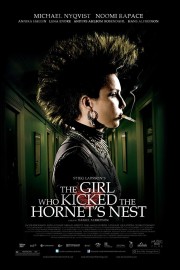The Girl Who Kicked the Hornet’s Nest
I’ve seen the movies. Hopefully, by the time David Fincher’s first film adaptation comes out next December, I’ll have begun reading the books.
Stieg Larsson found an original and quite absorbing way of crafting a conspiracy thriller in a day and age where seemingly every variation of the genre has been seen or read. His posthumous novels have become phenomenons the world over, and I, for one, have the Swedes to thank for introducing me to his world. That we’ve been graced with the theatrical releases of their television adaptations of Larsson’s legacy is one of 2010’s genuine cinematic pleasures.
Throughout “The Girl With a Dragon Tattoo,” “The Girl Who Played With Fire,” and now “The Girl Who Kicked the Hornet’s Nest,” we’ve been engaged in the uncovering of mysteries of both personal and political natures to Lisbeth Salander (Noomi Rapace) and Mikael Blomkvist (Michael Nyqvist). In the first film, it was discovering the truth of a young woman’s disappearance. In the second and third films, it has been about righting the wrongs in Lisbeth’s past, as a shadowy political force (known only as The Section in this film) is conspiring to silence Lisbeth about their secrets, including what her father (Georgi Staykov) did to Lisbeth and her mother that landed a then-12-year-old Lisbeth in a mental institution.
Part of the trilogy’s fascination has been how it’s danced around a potential romantic relationship between Lisbeth and Mikael without really committing to it…or dismissing it entirely. Rapace and Nyqvist have been exceptional at playing that tension without overstating it, making it all the harder to imagine anyone else (including Rooney Mara and Daniel Craig, Fincher’s stars-to-be) in these roles. But there’s something else about these characters as well. In “Dragon Tattoo,” computer hacker Lisbeth was helping investigative journalist Mikael in not only his search for a missing person but also in helping him beat a libel rap that threatened to send him to jail. In “Played With Fire” and “Hornet’s Nest,” which are essentially the same story (likely explaining why Daniel Alfredson directed both films), the roles are reversed, and Mikael must use his resources to shed light on the tragedies in Lisbeth’s life and how The Section has worked to keep Lisbeth quiet. But Lisbeth has her own ways of getting things done, and how she helps Mikael in the right direction is a sign of her trust in him. The result has elements of a courtroom drama, but none of the stuffiness that comes with that overworked genre. Then again, that’s not surprising when you consider this isn’t a Hollywood production (even if the ending reeks of nice-and-tidy storytelling). Hopefully Fincher will follow that path as he brings Larsson’s trilogy to the screen with Mara and Craig.










